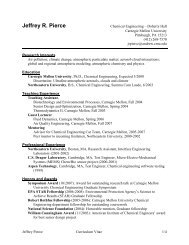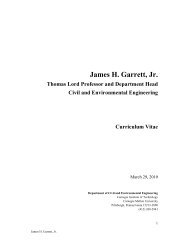1996 Electronics Industry Environmental Roadmap - Civil and ...
1996 Electronics Industry Environmental Roadmap - Civil and ...
1996 Electronics Industry Environmental Roadmap - Civil and ...
You also want an ePaper? Increase the reach of your titles
YUMPU automatically turns print PDFs into web optimized ePapers that Google loves.
Appendix J<br />
The ordinance requires Umweltforum Haushalt to establish a fund to pay for recycling costs<br />
when the product is disposed of in 10 to 20 years. The industry group is allowed to accrue the<br />
interest earned on the money during this lag period. When equipment is returned into the system,<br />
any accrued interest is credited towards recycling costs. This will act to increase the monetary<br />
value of the initial down payment, while lowing the end-of-life disposal charge.<br />
Although the Umweltforum Haushalt system only “officially” covers products sold since enactment<br />
of the ordinance, the existence of the industry-established infrastructure facilitates the collection<br />
<strong>and</strong> recycling of pre-ordinance equipment. For pre-ordinance equipment, consumers in<br />
Austria can also opt to use municipal collection centers in lieu of the private system. By law<br />
local authorities must h<strong>and</strong>le waste disposal, including the disposition of refrigerators, freezers,<br />
<strong>and</strong> air conditioners. Before 1993 the h<strong>and</strong>ling of these bulky items was absorbed in the<br />
municipal tax base. The ordinance for refrigerators <strong>and</strong> freezers gave municipalities the authority<br />
to charge consumers a discrete market-based recycling fee, payable at the point of collection,<br />
providing municipalities with an incentive to compete for refrigerators <strong>and</strong> freezers with the<br />
private system.<br />
The current recycling infrastructure reflects an important change, resulting from two years of<br />
experience with appliance recycling. Amendments to the recycling ordinance in March 1995<br />
changed the fee structure from an entirely prepaid system to the current down payment plus endof-life<br />
fee. Under the previous system, consumers were required to pay the entire cost of<br />
disposal at the time of product purchase. As a result, Austria’s retailers lost business to Germany<br />
<strong>and</strong> Italy, particularly in border regions. (Under the old fee structure, consumers could also use<br />
the fully prepaid coupon to recycle an old refrigerator. After moving to the partial payment<br />
scheme, coupons can only be used for recycling the new product at the end of its life in 10 to 20<br />
years.)<br />
According to the Umweltforum Haushalt <strong>and</strong> the Austrian Ministry, there are no reliable figures<br />
on the total recovery <strong>and</strong> recycling rates for appliances, since several systems are currently<br />
operating (i.e., private <strong>and</strong> public collection systems; equipment with <strong>and</strong> without prepayment<br />
stickers). The Umweltforum only collects data on the equipment recycled with prepaid coupons,<br />
which in 1994 accounted for half of the refrigerators recycled in Austria (75,000 of 150,000).<br />
These figures are misleading—they do not capture the pre-ordinance equipment recycled in the<br />
private system without coupons (i.e., consumer paid entire recycling fee at point of disposal).<br />
For the next several years, the Umweltforum also expects to see its figures decrease as fewer<br />
units are returned with coupons, reflecting the amendment to the ordinance. These figures will<br />
turn around when equipment sold since 1993 comes to the end of its life.<br />
Switzerl<strong>and</strong>: Private Prepaid Recycling System<br />
The Swiss Economic Association of Information, Communication, <strong>and</strong> Organization Technology<br />
(SWICO) established a convention for the management of end-of-life equipment in April of<br />
1994. Any member of SWICO importing or producing office equipment or computers can<br />
become a party to the convention. Signatories of the convention voluntarily commit to life cycle<br />
environmental responsibility, including: 1) avoidance of wastes, 2) reduction of harmful<br />
substances during manufacturing processes, 3) waste utilization through reuse or value material<br />
252






